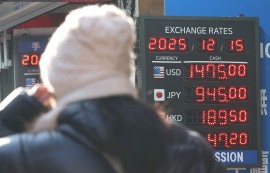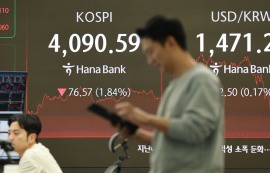 이미지 확대보기
이미지 확대보기미국은 해마다 두번씩 각국의 환율 운영 상황에 대해 의회에 보고하고 있다.
보고서 이름은 Report To Congress on International Economic and Exchange Rate Policies이다.
의회에 제출하는 국제경제및 환율 정책 보고서다.
환율 조작국으로 지정된 나라에 대해서는 미국이 보복을 가할 수 있다.
20일 발표된 이 반기보고서에서 한국은 또 환율을 조작하고 있는 나라로 지적됐다.
보고서는 "한국이 달러화에 대한 원화가치 상승 압력에 저항하기 위해 올해 상반기에 계속 개입한 것으로 보인다"고 지적했다.
미국 재무부는 지난 4월 발표된 상반기 보고서에서도 "재무부가 한국 당국에 외환시장 개입을 줄여야 한다는 점을 분명히 했다"고 지적한 바 있다.
이보고서에는 한국이 원화를 시장 실제보다 5~13% 저평가하고 있다는 IMF 평가를 그대로 인용하고 있다.
The most recent IMF assessment found that the Korean won was undervalued in 2014 by 5 to 13 percent.
환율을 내려야 한국경제가 안정적이고 보다 내실있는 성장을 할 수 있을 것이란 충고도 곁들이고 있다.
박근혜 대통령이 미국을 방문했을 때에도 한국과 미국간에 환율문제가 이슈가 됐던 것으로 전해지고 있다.
 이미지 확대보기
이미지 확대보기정상회담에서 환율문제가 의제로 논의된 것은 매우 이례적이다.
미국이 앞으로 한국에 대한 환율 공세를 강화하겠다는 의지가 담긴 것으로 보인다.
한국 원화의 환율은 저평가 되어 있으며 그것이 한국정부의 환율조작에 의한 것이라는게 재무부 환율보고서에 나타난 미국의 입장이다.
이같은 미국의 지적이 사실이라면 향후 환율은상당한 영향을 받을 것으로 보인다.
사실이 아니라면 우리정부의 환율외교에 문제가 있다고 하지 않을 수 없다.
중국과 일본이 우리보다 훨씬 더 큰 폭의 환율 인상을 단행하고도 초점에서 벗어난 것을 반면교사로 삼을 필요가 있다.
다음은 미국 환율 보고서 보도자료 전문
WASHINGTON – The U.S. Department of the Treasury today released the Semi-Annual Report to Congress on International Economic and Exchange Rate Policies, as required under Sections 3004 and 3005 of the Omnibus Trade and Competitiveness Act of 1988.
The Report describes U.S. economic developments as well as international economic, financial, and exchange rate developments during the first half of 2015, and where pertinent and available, through end-September 2015.
Based on the analysis in this report, the Treasury Department has concluded that no major trading partner of the United States met the standard of manipulating the rate of exchange between its currency and the United States dollar for purposes of preventing effective balance of payments adjustments or gaining unfair competitive advantage in international trade as identified in Section 3004 of the Act during the period covered in the Report.
The Report highlights that second quarter growth confirmed a strong trajectory for the U.S. economy following a weak first quarter. Growth in the first quarter was just 0.6 percent due in part to harsh winter weather and several other one-off factors. This was followed by a robust second quarter during which growth was 3.9 percent. The Report adds that the federal budget deficit for FY2015 was 2.5 percent of GDP, its lowest level since 2007.
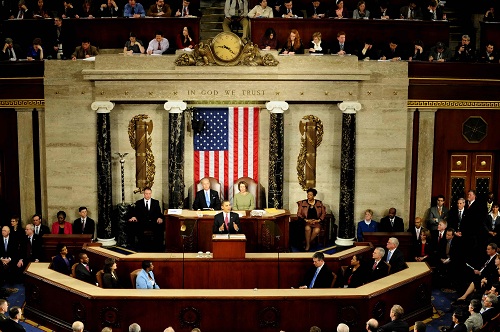 이미지 확대보기
이미지 확대보기Today’s Report, however, concludes that despite strengthening demand in the United States, global economic growth in the first half of 2015 has been only modest. This reflects continued weak demand growth in many advanced economies as well as a weaker outlook across emerging market economies, which, at more than half of the world economy, exert a growing influence over global economic prospects. The Report highlights the need for economies to use all levers of policy–fiscal, monetary, and structural–to boost demand, reduce unemployment, and curb external imbalances.
The Report states that while the euro area has emerged from recession, its growth is uneven and too soft overall, and is characterized either by pockets of quite high unemployment, as in Spain and Greece, or very large current account surpluses, as in Germany and the Netherlands. A major concern in the euro area is that demand is not stronger despite the extent of monetary stimulus now in place. Boosting demand growth through increased fiscal support for infrastructure investment and greater private consumption is essential to sustaining the recovery of the euro area and peripheral countries in particular.
The Report notes that the August 11 change in how China sets the daily reference rate of its exchange rate regime, together with signs of slowing growth in China, created market expectations that the RMB would depreciate further against the dollar in the short-run. The move surprised markets, underscoring the importance of conducting macroeconomic policy transparently. The Department of the Treasury is carefully monitoring the implementation of the new exchange rate policy approach and how it will work in practice—specifically, whether China will allow the RMB to respond to market forces for appreciation as well as for depreciation.
The Report notes the sizable and growing current account surplus in China. In addition, China needs to meaningfully shift its domestic economy towards greater reliance on household consumption; a variety of policies will be necessary to bring this rebalancing about, and the government has scope, alongside other measures, to provide additional fiscal support for household consumption. But further currency appreciation is also key to this process and will support the purchasing power of Chinese consumers and help shift production towards non-traded goods and services. Given economic uncertainties, volatile capital flows, and prospects for slower growth in China, the near-term trajectory of the RMB is difficult to assess. However, our judgment is that the RMB remains below its appropriate medium-term valuation.
In Japan, the Report notes that domestic demand has not fully recovered after the consumption tax was increased in March 2014, contracting further in the second quarter of 2015. Recalibrating fiscal policy to support economic growth and minimize fiscal drag would help avoid overburdening monetary policy and reliance on yen depreciation to support externally-driven growth.
 이미지 확대보기
이미지 확대보기In Korea, a number of factors continue to point to an undervalued won. The Report urges Korea to limit its foreign exchange intervention to circumstances of disorderly market conditions and to take steps to make the management of the currency more transparent. Appreciation of the won over the medium term would also help Korea reorient its economy away from its current heavy reliance on exports.
The Report includes a special annex highlighting the major shift in income that is occurring from oil exporting economies to oil importing economies as a result of the fall in oil prices. Asia, in particular, benefits but so too do Europe and the United States. Partly as a result of weak demand in certain surplus economies, but also because of the lower price of oil, the current account surpluses of oil importing economies have increased. The global economy would benefit from stronger domestic demand in these economies.
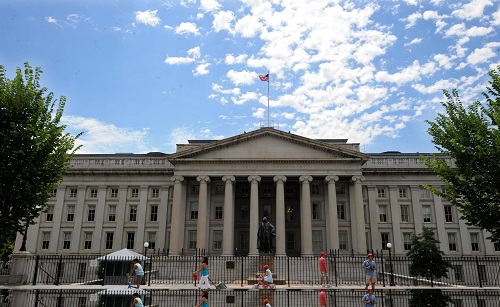 이미지 확대보기
이미지 확대보기The Report underscores the crucial importance of comprehensive adherence to all G-7, G-20 and International Monetary Fund exchange rate commitments. These include the G-7 commitments to orient fiscal and monetary policies towards domestic objectives using domestic instruments and to not target exchange rates. They also include the G-20 commitments, which were re-affirmed at the G-20 Finance Ministers and Central Bank Governors Meeting in Ankara, Turkey in September, to move more rapidly toward market-determined exchange rate systems and exchange rate flexibility, to avoid persistent exchange rate misalignments, to refrain from competitive devaluation, and to not target exchange rates for competitive purposes.
김대호 경제연구소 소장 tiger8280@




















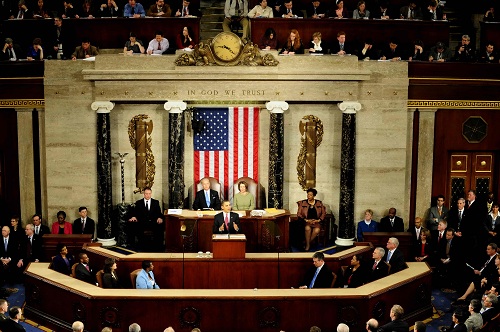

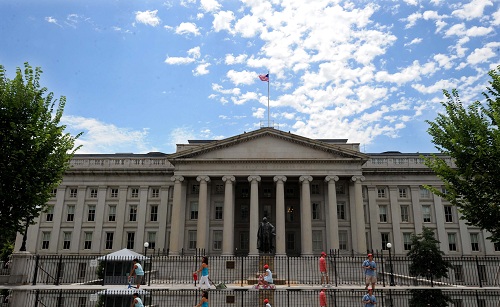



![[2026 대전망] 혁신·포용의 'K-AI시티' 전환](https://nimage.g-enews.com/phpwas/restmb_setimgmake.php?w=270&h=173&m=1&simg=2025121516594408240c35228d2f510625224987.jpg)
